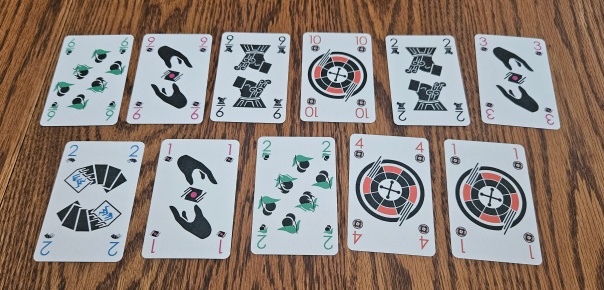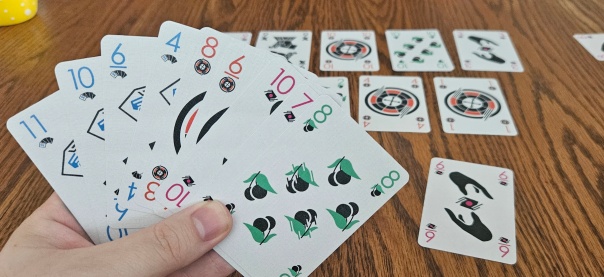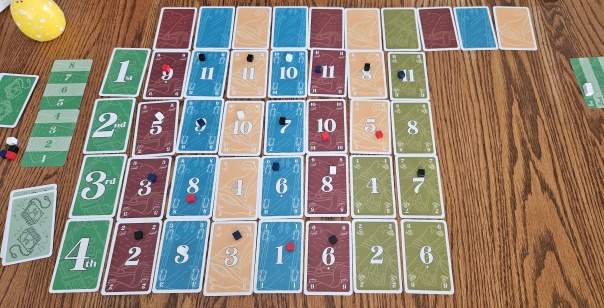Must Follow
All I play anymore is trick-taking games.
Which can be a good thing when the trick-takers in question are this interesting. We’ve looked at some of the titles from New Mill Industries in the past. Their modus operandi is to produce good trick-takers that might otherwise go unexamined. Today’s examples are Japanese imports, both of them slightly older, which tinker with the “must follow” rule common to the genre.
The Icarus Club
Welcome to the Icarus Club, the portentously-named gambling den that gladly hosts anyone who doesn’t hit it too big. Designed by Hugame, this one opens with a row of cards in the middle of the table. This is the club’s schedule, a public declaration of what gamblers can expect to wager on in the coming hours. It’s also a declaration of each hand’s forthcoming suit. Think of these as the led cards: everybody is required to follow suit if possible, and anyone who cannot match the suit is immediately ineligible to win the trick.
There are two wrinkles to this formula, both of which prevent The Icarus Club from becoming too chancy. The first is that the club’s gamblers have some control over which games will be played next. When somebody wins a trick, they claim the current schedule card and all cards played into the trick. But! They then select one of those cards and lay it over the top of a future slot in the schedule. The house may always win, but being a high roller has its perks.
This alone wouldn’t produce the most exciting trick-taker. Naturally, the winner would schedule forthcoming games that they have a high chance of winning. The whole thing would soon snowball out of control.
That’s where the second wrinkle comes in. While each trick is awarded to the highest card of the scheduled suit, the overall winner of the game is less directly gauged. The Icarus Club, you see, is rather heavy-handed in its assessment of cheaters. Rather than actually investigating their high rollers, each night the highest winner is defenestrated, their winnings stripped. This leaves the second-hottest player in the lead.
It’s an essential alteration. Players are now encouraged to schedule future games that they can win, but not so often that they come out on top of the entire hand. This injects some strategy into the proceedings, especially when it comes to assessing what other players are holding. Trick-takers are sometimes criticized for requiring a bit too much card-counting, and The Icarus Club falls firmly into that category. If somebody goes out of suit early, you’d better file away that detail for later so you can leverage them into ill-timed wins. The same goes for counting high-ranked cards; it’s good to know when those trick-winning numbers have been used up. In both cases, the result is a high-attention game that’s as much about sabotaging your fellow players as it is about winning your own tricks.
Courtesy of the “second place wins” rule, the whole thing is also redolent of Schadenfreude without mimicking that game too closely. Or replicating its highs, if we’re being honest. The Icarus Club thrives on the strictness of its schedule, the tyranny of that procession of ranks and suits. It isn’t as freewheeling as Schadenfreude, nor does it produce the same big moments that see everybody howling at a disgraced leader. Not that it should! It’s a very different game, and it’s worthy of a look in its own right. But it invites the comparison with that second-place rule. In each of our sessions, somebody has commented on it, and not in The Icarus Club’s favor.
Still, as minor trick-takers go, it’s hard not to appreciate what Hugame is doing here. Newcomers to the genre often balk at the strictness of those suits. I certainly did, as described in the first part of my series This Trick-Taking Life. The Icarus Club is about interrogating and manipulating that strictness. Everybody is beholden to the same schedule — so why not force your fellow players into a tough spot? There’s a particular feeling the game is going for. You’re approaching the final stretch in the lead. Oh no! But you’ve properly seeded the schedule. Now the gambler who was previously trailing your score is on a suspicious hot streak. Moments later, they’re out the window. Farewell, my foe. The Icarus Club doesn’t always make good on that promise, but when it does, it’s superb.
Seven Prophecies
Keep the schedule in mind, because Seven Prophecies does something similar. Each hand opens with ten cards arrayed in a row; this is the sequence of suits everyone at the table must follow.
Right away, though, Hinata Origuchi does something different with the concept. Everybody at the table is an aspiring (blustering?) prophet. Rather than rearranging that schedule on the fly, your objective is to predict how you’ll fall in relation to the ensuing tricks. After examining your hand, you place a complex bid in secret, declaring how often you’ll win first, second, third, or fourth place. You’ll place seven bids in all — so, for example, if you’re holding a bunch of high cards in suits that appear often in the schedule, perhaps you prophesy that you’ll win first place four times. Good luck with that.
Once those bids are revealed, play begins. As in The Icarus Club, there’s a pause in between each trick. This time, everybody places their cards in order underneath the schedule and reveals whether they got one of their prophecies right. At first, it’s almost guaranteed that everybody has gotten something correct. It’s only in the third, fourth, and later tricks that everybody’s predictions unspool and things become uncertain. If somebody gets all of their prophecies right, they win the hand outright, earning greater amounts of points the earlier their predictions came true.
It’s contract bidding run amok — a strenuous, often amusing approach to one of the genre’s oldest appendages. Nicely, because you’re permitted to prophesy about coming in any position, any hand can succeed, even if mid-rank cards are somewhat tougher to assess than ranks on the extremes. It’s possible to become the prophet of mediocrity, the Antonio Salieri of trick-taking, declaring that you will place solidly second and third place to somebody else’s Mozart, and winning thanks to your foresight.
Still, I’m not wholly convinced the game’s scoring isn’t borked. Seven Prophecies largely depends on somebody getting their prophecy right. This terminates the hand, sending one player skyrocketing along the scoring track, someone else maybe scoring a pity point, and everybody else lagging in the dust. Chris Wray, another trick-taking designer we’ve highlighted here, has proposed an alternate scoring method that I prefer, one that inverts the scoring formula. Now points are something to avoid, with missed prophecies racking up points when the hand concludes — two points for a missed first-place bid, one point for all others. Perfect prophecies, meanwhile, threaten to launch any player to automatic victory if they happen to achieve it twice. After four hands, the lowest score wins.
There are certain advantages to this method, foremost among them that individual hands and the game at large are less likely to be lopped off prematurely. It also keeps everyone competitive; an early failure doesn’t lock you out of the game quite so thoroughly.
But that’s one of the things I love about this genre: it’s mutable. The highlight of Seven Prophecies is the way it tinkers with both ironclad must-follow rules and the dual flexibility-inflexibility of bidding however you like but then being held to those bids. I’m normally opposed to tweaking any rules, at least when it comes to writing about these things. In a trick-taker, doing so feels right and proper. That’s what makes this genre such a renewable source of innovation; every game feels like it’s riffing on every other game that came before it. Seven Prophecies sticks to that tradition, riffing on contract bidding and suit-binding; to uncover its best self, perhaps it also needs to be riffed on. The circle of life, as expressed in a compact deck of cards.
(If what I’m doing at Space-Biff! is valuable to you in some way, please consider dropping by my Patreon campaign or Ko-fi.)
A complimentary copy of each game was provided.
Posted on June 12, 2024, in Board Game and tagged Board Games, New Mill Industries, Seven Prophecies, The Icarus Club. Bookmark the permalink. 1 Comment.





Pingback: Trick-Taking Tranche | SPACE-BIFF!